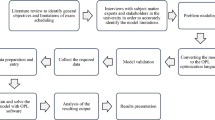Abstract
In order to give the best examination arrangement, we first analyzed the relevant factors and set up the model. Meanwhile, we calculated the probability of conflict arising from the random arrangements. Later, in order to better select the time period of the subject arrangement and evaluate the results, we established the local conflict function and the global benefit function. In addition, we used the dye matching algorithm and the genetic algorithm to solve it. Finally, we provided ideas for solving this problem with other intelligent algorithms.
Access this chapter
Tax calculation will be finalised at checkout
Purchases are for personal use only
Similar content being viewed by others
References
Shasha, Y.: Research on resource conflict optimization algorithm for college examination system. Wirel. Internet Technol. 03, 66–68 (2016). (in Chinese)
Li, C.: An improved graph algorithm for the examination of college entrance examination under the credit system environment. Appl. Comput. 24(03), 220–225 (2015). (in Chinese)
Long, H., Tan, C.: Requisition system based on genetic algorithm. Appl. Comput. Syst. 23(01), 184–187 (2014). (in Chinese)
Deyan, W.: Optimization of dynamic test arrangements algorithm. Wuxi Voc. Tech. Coll. 12(06), 14–16 (2013). (in Chinese)
Deyan, W.: Study on dynamic test arrangement based on particle swarm optimization. Digit. Commun. 40(05), 11–13 (2013). (in Chinese)
Wen, L.: Design and implementation of college course arranging system based on genetic algorithm. University of Electronic Science and Technology of China (2012)
Niu, Y., Yan, G., Xie, G., Xie, K.: Research on genetic algorithms based on knowledge. J. Taiyuan Univ. Technol. 42(02), 121–125 (2011). (in Chinese)
Cai, M.: Design and implementation of automatic college test-taking algorithm. Comput. Eng. Appl. 46(24), 69–72 (2010). (in Chinese)
Yong, O., Tao, L.: Design and implementation of college automatic examination system. J. Hubei Univ. Technol. 24(04), 67–70 (2009). (in Chinese)
Ling, T.: Design and implementation of university automatic test engine. Comput. Eng. Des. 10, 2443–2445 (2007). (in Chinese)
Qing, W., Yawen, Z., Wei, Z.: Staining-matching algorithm for college examination papers. J. Univ. Shanghai Sci. Technol. 02, 157–161 (2005). (in Chinese)
Zhu, S., Cao, S., Zou, X.: Mathematical model and its algorithm for scheduling problems. Syst. Eng. 02, 62–65 (1999). (in Chinese)
Wang, T., Su, Z., Xia, Y., Qin, B., Hamdi, M.: Towards cost-effective and low latency data center network architecture. J. Comput. Commun. 82, 1–12 (2016)
Wang, T., Xia, Y., Muppala, J., Hamdi, M.: Achieving energy efficiency in data centers using an artificial intelligence abstraction model. IEEE Trans. Cloud Comput. (2015)
Acknowledgments
In the process of research, we should especially thank Mr. Zhang for his guidance and supervision. Without his help, we can’t understand the pattern of the exam arrangement in our school. It will be hard for us to stick, and apply our model to reality. At the same time, we are grateful to become each other’s partners. We read the related literature or books together, and discuss for the model and algorithms. Besides, thank you to our school for providing us with a good learning environment.
Author information
Authors and Affiliations
Corresponding author
Editor information
Editors and Affiliations
Rights and permissions
Copyright information
© 2018 Springer Nature Singapore Pte Ltd.
About this paper
Cite this paper
Li, D., Su, Y., Dong, H., Zhang, Z., Shen, J. (2018). Analysis and Solution of University Examination Arrangement Problems. In: Yuan, H., Geng, J., Liu, C., Bian, F., Surapunt, T. (eds) Geo-Spatial Knowledge and Intelligence. GSKI 2017. Communications in Computer and Information Science, vol 849. Springer, Singapore. https://doi.org/10.1007/978-981-13-0896-3_66
Download citation
DOI: https://doi.org/10.1007/978-981-13-0896-3_66
Published:
Publisher Name: Springer, Singapore
Print ISBN: 978-981-13-0895-6
Online ISBN: 978-981-13-0896-3
eBook Packages: Computer ScienceComputer Science (R0)




